All in Central Government
Auckland Mayor Wayne Brown has finally gotten his overhaul of Auckland Transport over-the-line with Local Government and Transport Minister Simeon Brown, marking a significant win for the mayor who promised as a candidate to get rid of council-controlled organisations “as quickly as possible.”
In a bizarre post across his social media channels, ACT Party leader David Seymour has taken aim at Porirua City Councillor Kathleen Filo (Ngāti Toa Rangitira) for getting her council organised to oppose his Treaty Principles Bill and encouraging other councils to do likewise. But we have bad news for Seymour - local government politicians are allowed to disagree with you.
Local Government Minister Simeon Brown has reversed course on plans for proposals for Regional Deals to be by “invitation only” and has now invited all councils to work together with their regional colleagues to submit proposals with the region’s top five priorities and projects. The first deal is expected to be finalised by December 2025, with three deals anticipated to be in place just in time for the 2026 General Election.
The Department of Internal Affairs’ Local Government branch is meant to provide policy advice and an element of system stewardship for the local government sector, but their advice to Local Government Minister Simeon Brown on intervening in Wellington City Council contained an absolute howler of an error that should have been picked up.
Local Government Minister Simeon Brown is under investigation by the Ombudsman. It follows the discovery by Local Aotearoa that his office had not only failed in an OIA response to disclose his attendance at a Wellington Mayoral Forum, but also that his recollection of what was discussed at that meeting differed substantially from what the mayors in attendance recorded as being discussed around local government amalgamation in the greater Wellington region.
With Local Water Done Well, Regional Deals, and another attempt at replacing the Resource Management Act in the works, sooner rather than later, the Coalition is going to have to grapple with the state of our local government system. Given they rejected the recommendations from the Future for Local Government review, any process to reform the sector is going to have to go back to square one. So what might that involve?
Despite being a passionate advocate for local government and its role in helping our communities to grow and thrive, there’s widespread acceptance that the current system is unsustainable and that something needs to change. However, there’s little agreement on what that change should actually be, and it all boils down to - you guessed it - politics.
If you feel like hardly a day goes by without there being another story about councils under financial stress, you wouldn’t be wrong. Despite years of warnings, the financial system underpinning local government is creaking more than ever before, yet there appears to be little political appetite to make meaningful changes.
As speculation mounts over who might be appointed to be Local Government Minister Simeon Brown’s Crown Observer on Wellington City Council, it’s worth considering why exactly the intervention has been made and what areas of expertise you’d need in order to be able to best investigate and assist the council with the areas of concern that triggered the intervention in the first place.
While most eyes were on the drama unfolding with Wellington City Council, another significant intervention was unfolding with the Coalition introducing a last minute amendment to spike moves by Otago Regional Council to notify their land and water plan. The flexing of Parliament’s legislative muscle in this way is a stark reminder of how governments of both stripes have finite tolerance for councils not aligning with their national policy programmes.
In a widely expected move, Local Government Minister Simeon Brown has announced his intention to appoint a Crown Observer to Wellington City Council. With elected members seeming poised to accept the appointment in the next 10 working days, what unfolds over the coming weeks and months from both them as well as what the observer might uncover on the operational side of the council will be critical in determining whether further intervention is required or if things can return to normal at the end of their appointment.
Throughout the unfolding drama around Wellington City Council, Local Government Minister Simeon Brown keeps saying that the council is accountable to “Wellington ratepayers”. So what gives, and what does the law say about who local authorities are actually accountable to?
With Environment Canterbury, Kaipara District Council, and Tauranga City Council all having been replaced by commissioners in recent years, they all offer clues on what could be in store for Wellington City Council in the coming weeks and months if the installation of commissioners to replace elected representatives is genuinely on the cards.
Wellington’s beltway has been buzzing for months that Local Government Minister Simeon Brown will, at any moment, finally drop a sword of Damocles that’s apparently been hovering over Wellington City Council and install commissioners. More fuel was poured on the fire following remarks from Finance Minister Nicola Willis, Infrastructure Minister Chris Bishop, and Prime Minister Christopher Luxon, but how did we get to this point, how real is the threat of intervention now, and what steps are available to Local Government Minister Simeon Brown?
During his speech to LGNZ's SuperLocal conference, Prime Minister Christopher Luxon claimed that local government representatives asked him for more financial support, "usually in the form of cold, hard cash." The problem? The Prime Minister can't name a single mayor, councillor, or community board member who's told him that, leading to questions about the veracity of the Prime Minister's claim.
In telling councils on Q&A that supporting economic growth shouldn't be a priority for them, Local Government minister Simeon Brown has ended up awkwardly contradicting his own Regional Deals framework which talks up the importance of local government supporting economic growth and lists it as the first "priority objective" for the forthcoming deals.
In a surprise move, New Zealand First have announced they are introducing a member’s bill in Parliament to disestablish Auckland Transport, seemingly stealing a march on its governing partners seeing as Local Government Minister Simeon Brown had, only a few weeks earlier, indicating that Cabinet would be deciding the future of Auckland Transport later this year.
Despite having campaigned as vocal champions of localism in opposition to the previous Labour Government’s Three Waters reforms, the National-led Coalition Government has been ruthless in issuing diktats and threats at councils to reduce their independence since coming into office in moves that suggest their commitment to localism was only ever performative at best.
Prime Minister Christopher Luxon’s speech to LGNZ's annual SuperLocal conference appears to have missed the mark, with one attendee describing it as “paternalistic and visionless” while others were left bemused at Luxon’s apparent lack of understanding of the local government sector and the impact his own government’s actions have had on councils' finances.
Local Government Minister Simeon Brown may find himself in hot water for having failed to disclose discussions with Wellington’s mayors about amalgamation in an OIA response. The discovery of the discussion only came about thanks to a LGOIMA response from Masterton District Council that revealed both Brown, and ministerial colleague Chris Bishop, had talked about the issue at a Wellington Mayoral Forum meeting in March 2024.





















